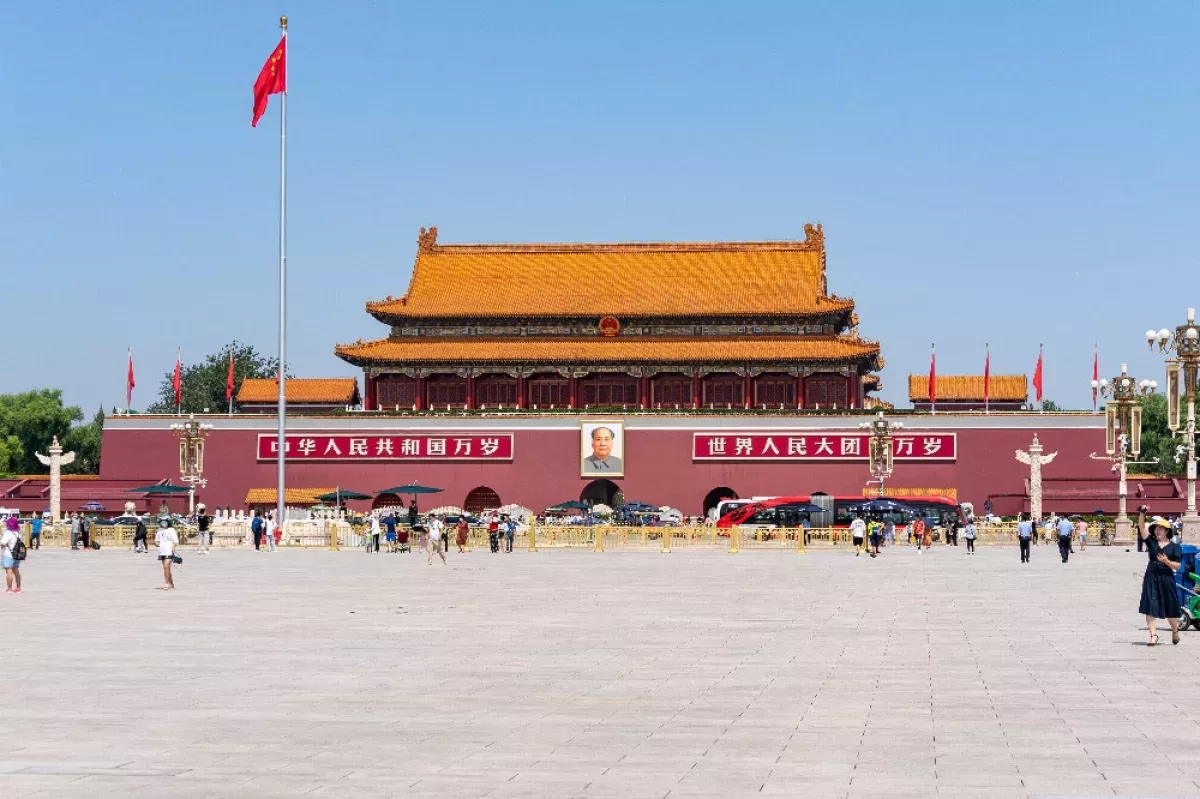Tiananmen Square, located in Beijing's city center, derives its name from the Tiananmen gate to its north, separating it from the Forbidden City. The square, measuring 765 x 282 meters, holds significant cultural importance as the site of pivotal events in Chinese history, including Mao Zedong's proclamation of the People's Republic of China on October 1, 1949. This anniversary is still commemorated in the square. Tiananmen Square houses several prominent structures: the Monument to the People's Heroes, the Great Hall of the People, the National Museum of China, and the Mausoleum of Mao Zedong.
1900: Boxer Rebellion and Eight-Nation Alliance
During the Boxer Rebellion in 1900, the Eight-Nation Alliance besieged Beijing and caused significant damage around Tiananmen Square, including burning down several ministries.
1919: No Events related to 1919 in this text portion.
No Events related to 1919 in this text portion.
1919: May Fourth Movement Protests
Tiananmen Square was the site of protests during the May Fourth Movement in 1919.
October 1, 1949: Founding of the People's Republic of China
On October 1, 1949, Mao Zedong proclaimed the establishment of the People's Republic of China in Tiananmen Square.
1949: Proclamation of the People's Republic of China
The People's Republic of China was proclaimed in Tiananmen Square in 1949.
1954: Demolition of the Gate of China
The Gate of China was demolished in 1954 to facilitate the enlargement of Tiananmen Square.
November 1958: Expansion of Tiananmen Square
In November 1958, a major expansion of Tiananmen Square began, lasting 11 months, aiming to create the world's largest public square.
August 1959: Completion of Tiananmen Square Expansion
The expansion of Tiananmen Square, which began in November 1958, was completed in August 1959.
October 1, 1959: End of Annual Military Parades
The annual mass military displays in Tiananmen Square for the anniversary of the PRC's proclamation ended on October 1, 1959.
1959: First Decade of National Day Parades
For the first decade of the PRC, annual military parades were held in Tiananmen Square on National Day (October 1st) until 1959.
1966: National Day Celebration during the Cultural Revolution
A National Day celebration took place in Tiananmen Square in 1966, during the Cultural Revolution.
1969: Cultural Revolution Impact on National Day Celebrations
The Cultural Revolution nearly caused the cancellation of National Day celebrations in Tiananmen Square in 1969.
1970: National Day Celebration during the Cultural Revolution
A National Day celebration was held in Tiananmen Square in 1970, amidst the Cultural Revolution.
1971: Portraits of Communist Leaders Erected
Large portraits of communist leaders, including Marx, Engels, Lenin, Stalin, Sun Yat-sen, and Mao Zedong, were erected in Tiananmen Square in 1971.
1976: Tiananmen Square protests of 1976
Protests took place in Tiananmen Square in 1976 following the death of Zhou Enlai.
1979: Cancellation of Large-Scale National Day Celebration
The CCP decided against a large-scale National Day celebration in 1979 due to Deng Xiaoping's power consolidation and the Sino-Vietnamese War.
1980: Removal of Communist Leader Portraits
In 1980, following Mao's death and a shift in political ideology, the portraits of communist leaders were removed from Tiananmen Square.
1984: 35th Anniversary Parade
A military parade was held in Tiananmen Square in 1984 for the 35th anniversary of the People's Republic of China, coinciding with Deng Xiaoping's rise to power.
1984: Military Parade for 35th Anniversary of the PRC
A military parade was held in Tiananmen Square in 1984 to mark the 35th anniversary of the People's Republic of China.
October 1989: Cancellation of National Day Activities
The aftermath of the Tiananmen Square massacre led to the cancellation of National Day activities in October 1989.
1989: Tiananmen Square Protests and Crackdown
In 1989, Tiananmen Square was the location of major protests that ended with a violent crackdown by the People's Liberation Army. Many student leaders escaped abroad after.
1989: Goddess of Liberty Statue
The Goddess of Liberty statue was erected in Tiananmen Square in 1989 during the protests.
1999: 50th Anniversary of the PRC
A military parade was held in Tiananmen Square in 1999 to commemorate the 50th anniversary of the People's Republic of China.
1999: 50th Anniversary Military Display and Parade
Military displays and parades were held in Tiananmen Square in 1999 for the 50th anniversary of the PRC.
2001: Tiananmen Square Self-Immolation Incident
The Tiananmen Square self-immolation incident happened in 2001.
2009: 60th Anniversary of the PRC
A military parade was held in Tiananmen Square in 2009 to celebrate the 60th anniversary of the People's Republic of China.
2009: 60th Anniversary Military Display and Parade
Military displays and parades took place in Tiananmen Square in 2009, marking the 60th anniversary of the PRC.
2013: Terror Attack
A terror attack involving a vehicle plowing into pedestrians occurred in Tiananmen Square in 2013.
Dec 15, 2021: Visitor Reservation Requirement
Starting December 15, 2021, visitors were required to make reservations before entering Tiananmen Square.
2023: 34th Anniversary of Tiananmen Square Crackdown
In 2023, over 20 people, including activist Alexandra Wong, were detained in Tiananmen Square on the 34th anniversary of the crackdown.
Trending

51 minutes ago Jon Hamm Discovers Viral Dancing Meme; Reacts to Meme-Worthy Status at 54.

51 minutes ago Georgia: Missing child found safe after Amber Alert issued in Barrow County.

2 hours ago Selena Gomez Defends Benny Blanco Amid Dirty Feet Frenzy and Divorce Comments.

2 hours ago Blackpink Announces New Album 'DEADLINE' and Teases New Era.

2 hours ago Christian Bale transforms for 'The Bride,' calls character 'old-fashioned,' praises Gyllenhaal's script.
2 hours ago Jaden McDaniels' rise with Timberwolves foreseen by Crawford; joins Leonard's exclusive group.
Popular

Jesse Jackson is an American civil rights activist politician and...

Susan Rice is an American diplomat and public official prominent...

Barack Obama the th U S President - was the...

XXXTentacion born Jahseh Dwayne Ricardo Onfroy was a controversial yet...

Michael Joseph Jackson the King of Pop was a highly...

Kashyap Pramod Patel is an American lawyer who became the...

